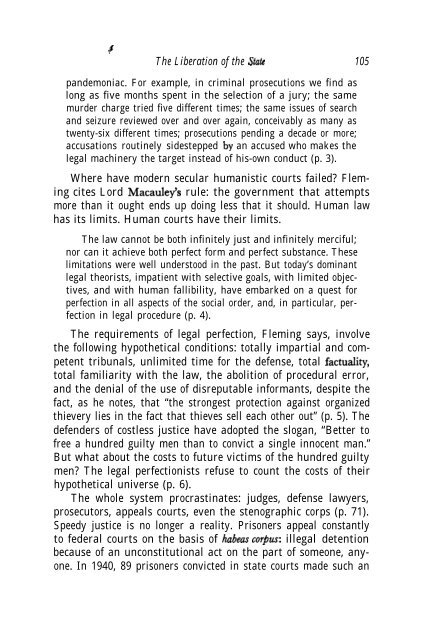Liberating Planet Earth
by Gary DeMar
by Gary DeMar
You also want an ePaper? Increase the reach of your titles
YUMPU automatically turns print PDFs into web optimized ePapers that Google loves.
4<br />
The Liberation of the State 105<br />
pandemoniac. For example, in criminal prosecutions we find as<br />
long as five months spent in the selection of a jury; the same<br />
murder charge tried five different times; the same issues of search<br />
and seizure reviewed over and over again, conceivably as many as<br />
twenty-six different times; prosecutions pending a decade or more;<br />
accusations routinely sidestepped by an accused who makes the<br />
legal machinery the target instead of his-own conduct (p. 3).<br />
Where have modern secular humanistic courts failed? Fleming<br />
cites Lord Macauley’s rule: the government that attempts<br />
more than it ought ends up doing less that it should. Human law<br />
has its limits. Human courts have their limits.<br />
The law cannot be both infinitely just and infinitely merciful;<br />
nor can it achieve both perfect form and perfect substance. These<br />
limitations were well understood in the past. But today’s dominant<br />
legal theorists, impatient with selective goals, with limited objectives,<br />
and with human fallibility, have embarked on a quest for<br />
perfection in all aspects of the social order, and, in particular, perfection<br />
in legal procedure (p. 4).<br />
The requirements of legal perfection, Fleming says, involve<br />
the following hypothetical conditions: totally impartial and competent<br />
tribunals, unlimited time for the defense, total factuality,<br />
total familiarity with the law, the abolition of procedural error,<br />
and the denial of the use of disreputable informants, despite the<br />
fact, as he notes, that “the strongest protection against organized<br />
thievery lies in the fact that thieves sell each other out” (p. 5). The<br />
defenders of costless justice have adopted the slogan, “Better to<br />
free a hundred guilty men than to convict a single innocent man.”<br />
But what about the costs to future victims of the hundred guilty<br />
men? The legal perfectionists refuse to count the costs of their<br />
hypothetical universe (p. 6).<br />
The whole system procrastinates: judges, defense lawyers,<br />
prosecutors, appeals courts, even the stenographic corps (p. 71).<br />
Speedy justice is no longer a reality. Prisoners appeal constantly<br />
to federal courts on the basis of habea cor#M-s: illegal detention<br />
because of an unconstitutional act on the part of someone, anyone.<br />
In 1940, 89 prisoners convicted in state courts made such an

















